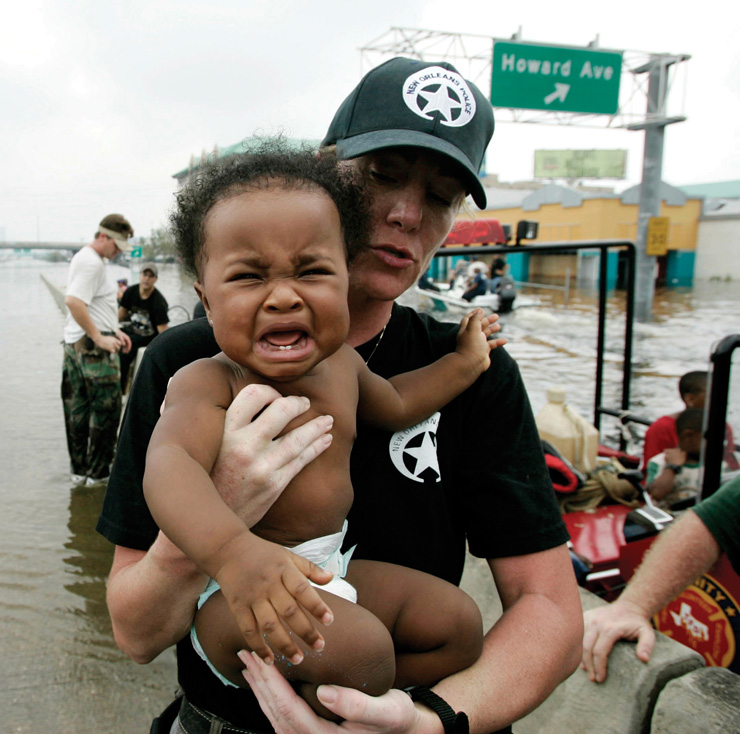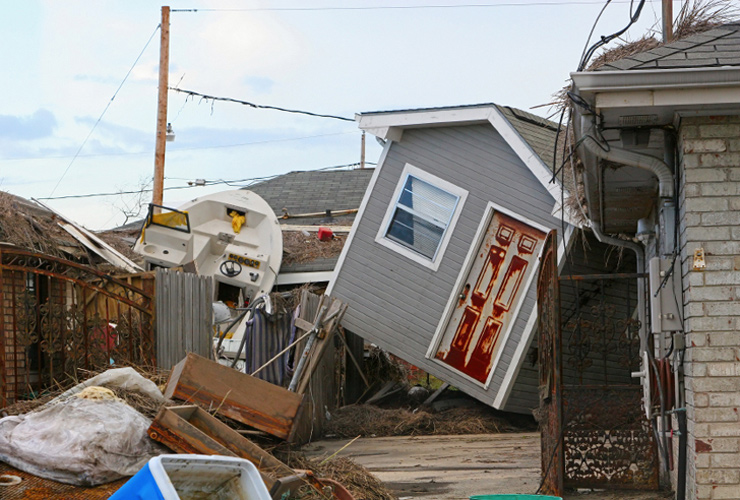
Baby rescued from Hurricane Katrina cries in the arms of a policewoman after being brought to land in New Orleans.
The suicides are starting to swell.
These deaths—sudden, violent and wrenching—bring a whole new wave of grief and despair to former Gulf Coast residents, some of them now back home, most still displaced in makeshift living quarters throughout the country.
These suicides also bring risk for more deaths.
That’s because losing someone to suicide places those close to the deceased at heightened risk for dying by suicide themselves.
“This displacement is more like from a war. People are scattered. Kids are dropped into schools,” says Frank Campbell, PhD, LCSW, executive director of the Baton Rouge Crisis Intervention Center (BRCIC) Foundation. Campbell noted that phones at the center rang non-stop in the wake of Katrina.
As for his staff? They’re fighting compassion fatigue, according to Campbell, just like thousands of other emergency responders and caregivers, some of whom have seen more devastation and heartache than they can bear.
Among these are Paul Accardo and Lawrence Celestine, the two New Orleans police officers who died in September by their own hand, using their own guns. Their deaths, yet another emotional blow to their grieving NOPD colleagues, were only the beginning of rising suicides in the hurricanes’ wake.
On December 7 The Washington Post reported that the number of suicides in Jefferson Parish is more than double what it was in fall 2004. Nearly half of residents of Orleans and Jefferson Parishes were experiencing “significant distress or dysfunction” according to a survey conducted in October by the Centers for Disease Control and Prevention (CDC).

A driveway and back yard are littlered with debris after Hurricane Katrina. Sheds and boats piled on top of fences and house roofs.
Suicidal thoughts, planning and attempts also appear to be on the rise, along with symptoms suggestive of post-traumatic stress disorder, say emergency responders, state officials and crisis interventionists.
“We’re seeing a substantial increase in people with suicidal ideation,” notes John Draper, PhD, executive director of 1-800-273-TALK, a national suicide-prevention hotline. Calls to the network from Gulf Coast states Louisiana, Mississippi and Texas have increased more than threefold since Katrina, according to Draper.
Peaking in late September, calls are now at about 300 per week—triple the call level from this region prior to Katrina. Yet, in the midst of these troubling indications, the Louisiana Department of Mental Health is preparing for 2006 budget cuts of 5 percent that may go even deeper.
“I’ll tell you, it’s not a good forecast for the future,” says the BRCIC’s Campbell, an expert on surviving traumatic loss including that brought about by suicide. “The compassion fatigue is incredible. We’re heading into a spiral.”
Campbell’s concern is consistent with research emphasizing the need for immediate mental health support after severe disasters.
A just-released study of suicide after the 1999 Taiwan Chi-Chi earthquake, published in the December 2005 Acta Psychiatrica Scandinavica, found that suicide rates among the high-exposure group were more than 40 percent higher during the 26 months following the earthquake. This points to the critical need to provide strengthened psychiatric services during the first year following major disasters.

